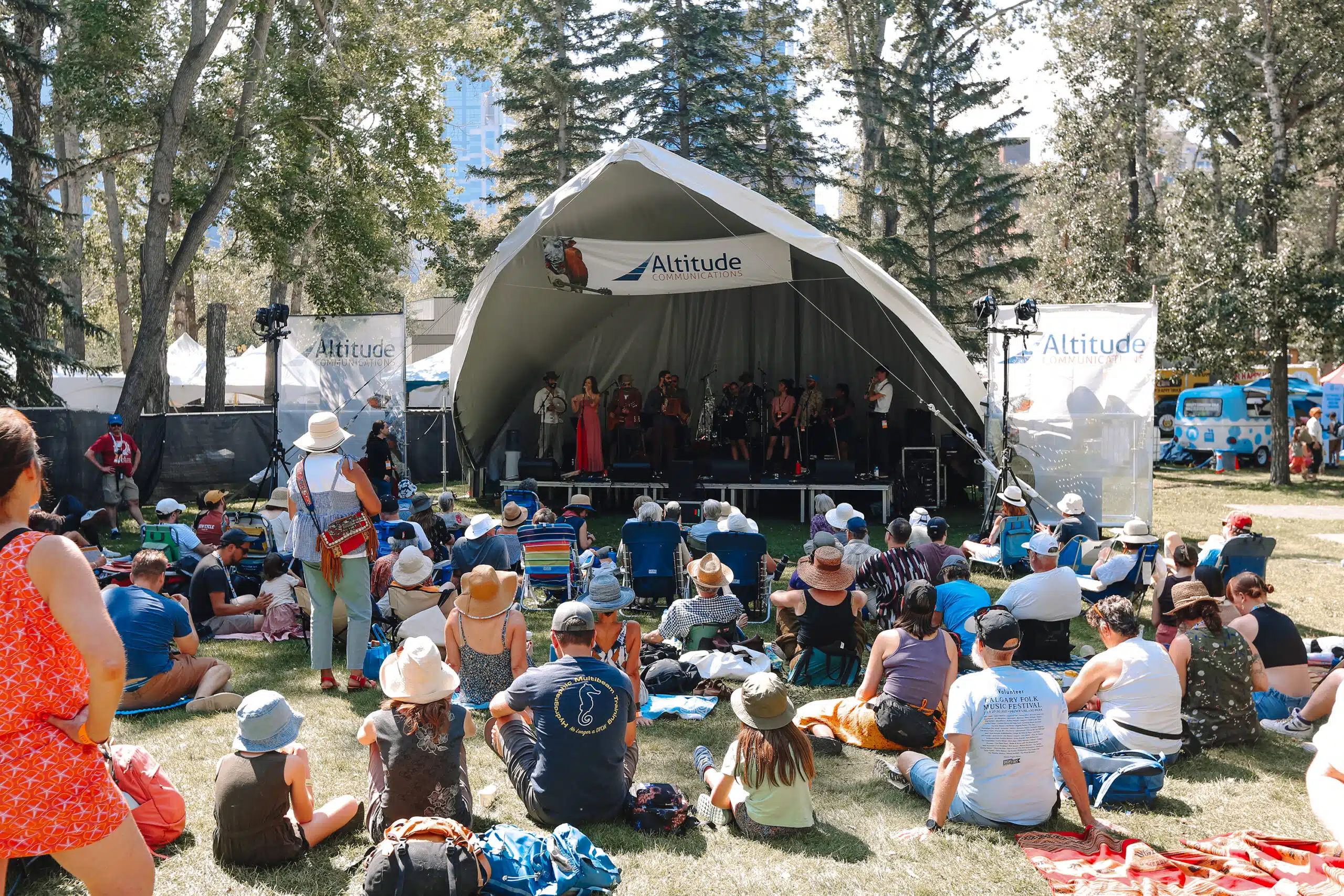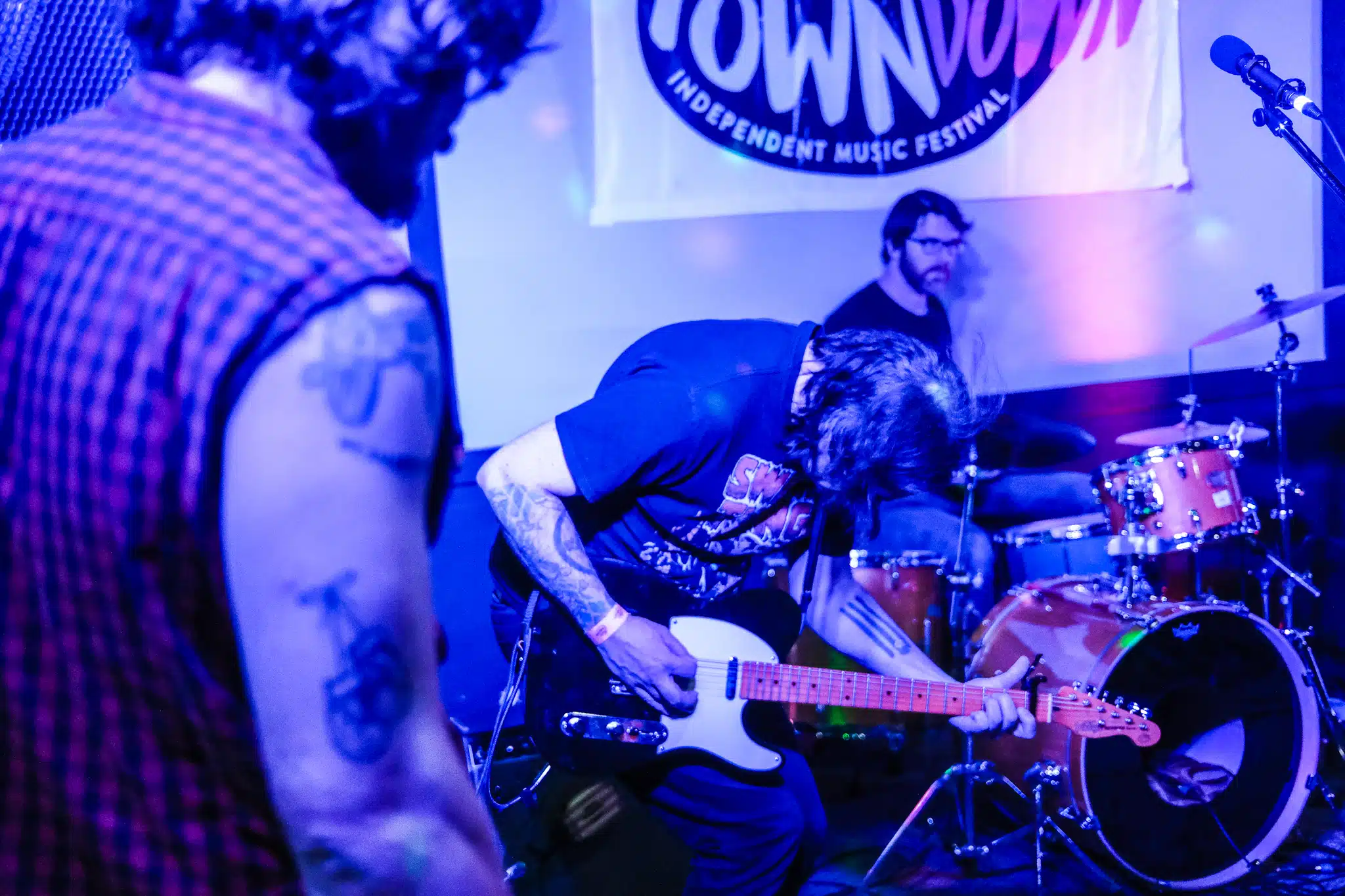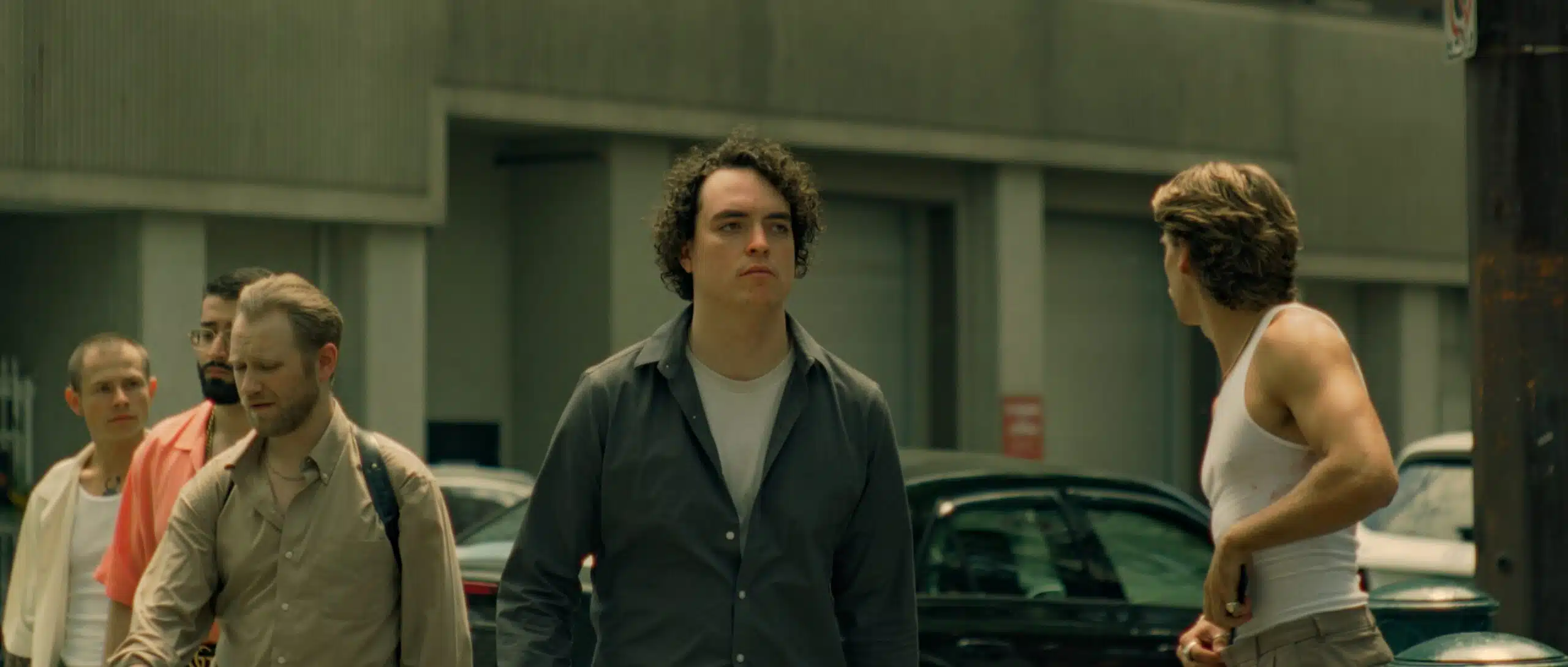Calgary Folk Music Festival 2023. Photo by Caitlind Brown.
Calgary’s arts festivals adapt to change
On March 9, Theatre Calgary announced that Shakespeare by the Bow would be going on hiatus in 2024. It wasn’t an easy decision.
“It was heart-wrenching,” says Theatre Calgary’s executive director Maya Choldin. “We are really proud of 13 seasons of producing Shakespeare in the summer, but it’s tough times right now. We’re just ensuring that we survive and are healthy, strong, and as organized as possible to serve as many people as possible. “
The financial realities of organizing outdoor arts events, particularly in the aftermath of COVID-19, are stark. “Since we were back in-person post-pandemic, cancelling the production has been a conversation. Even before the pandemic, there were years of projected losses,” says Choldin.
She estimates that producing Shakespeare by the Bow costs nearly $400,000 a year. Much of that budget was allocated to logistics, such as fencing around performance areas and security trailers. Even the scaled-down touring version of the production, Shakespeare on the Go, which ran last summer cost roughly $200,000. And despite corporate and audience donations, the event ran at a loss for Theatre Calgary in most years. With inflation that was expected to get worse.
This yearly tradition has seen many changes in its 20+ year history. Originally known as “Shakespeare in the Park,” this program was started by Mount Royal University in 1987 to bring accessible, public Shakespeare performances to Prince’s Island. Theatre Calgary and MRU collaborated to revive the program in 2011, rebranding it as “Shakespeare by the Bow.” In response to the COVID-19 pandemic, the production hit the road in 2021 as “Shakespeare on the Go.” It toured to various locations in Calgary during 2022 and 2023.
The show will need to see another adaptation to survive. “I can see it coming back with a partnership, no problem,” says Choldin. ‘Theatre Calgary would participate and support that in every possible way.”
Despite the hiatus from Shakespeare by the Bow, for the most part, Calgary’s outdoor festivals seem to be doing well, especially compared to the situation in other Canadian cities. Last year, for example, the Vancouver Folk Music Festival announced it would need to dissolve its organization and cancel its event — emergency provincial funding saved the event.
It is increasingly crucial for outdoor festivals to change with the times to survive. This was abundantly clear to the Calgary Reggae Festival Society. The last outdoor ReggaeFest that the group produced was in 2017, with a break in 2018 and an attempt at indoor programming in 2019. “We wanted to return in 2020, but it was a struggle, financially,” says the festival’s producer, Leo Cripps. “COVID came around and forced us to take a break.”
From 2004 to 2017, the Society hosted ReggaeFest for several days yearly at the massive Shaw Millenium Park. “What a lot of folks don’t even realize is that before you sell a ticket to an event, you’re already in the $100,000 range with equipment rentals and then another $20,000 for infrastructure and performance fees,” says Cripps. “By 2019, we were at the stage of burnout. There’s a lot of stress, and honestly, we didn’t feel it was appreciated enough for the energy we put into it.”
ReggaeFest reinvented itself this year with SUNNY Soul Jam, a single-day outdoor live music event in ContainR Art Park to be held on June 15.
“Throughout 2023 and 2024, we produced some indoor shows, which was pretty straightforward,” says Cripps. “We thought, let’s take that model for an indoor show and take it outside.” The financial pressure is much lighter on ReggaeFest, with the park already containing performance infrastructure and a targeted ticket count of 500 attendees.
“It’s all running smoothly. That’s the scary part of it,” says Cripps. “We’re used to many stresses and struggles behind the scenes. This year, it’s just smooth sailing. We love the idea of it and the name as well. It reflects where the show is in Sunnyside and how it could be a sunny day. If it goes well, we will definitely continue doing it.”
Change and evolution are also familiar territory for the Sled Island Music & Arts Festival, which takes place this year from June 19 to 23. Since the historic flood of 2013, the event has consistently changed when needed, and this year is no different. “We, like everyone else, are being affected by the prices of things going up,” says Hemen Tor-Agbidye, festival manager for Sled Island. “The big question we had last summer was, how do we adjust to that while keeping everything accessible to attendees?” Artist fees, for example, have been consistently rising to match the increased cost of plane tickets.
Grant funding from organizations like FACTOR Canada and significant sponsors like ConnectFirst Credit Union has helped soften these blows. “Then you’ve got local heroes like Dandy and 88 Brewing, who are always on board trying to support,” says Tor-Agbidye. The festival cancelled the Sled Island Block Party event in Ramsay this year because of lack of funding, but in its place, both breweries will offer outdoor shows on the Saturday of the festival.
Meanwhile, The BUMP Festival is trying to streamline its events this year. “We’re trying to restrict it to two weeks of August,” says BUMP’s festival and events manager Ryan Tram. “It makes it easier for us to have a more cohesive package as a festival with a clear through line. So we’re trying to hone in, be strategic, and increase the impact without killing us from a labour perspective.”
From August 3 to 18, BUMP will host a conference on the practice of art murals, made possible through city funding of panels, workshops, networking events, and speeches.
“We’re starting to see the post-COVID funding disappear, and it begs the question: what is the next step? How do we prepare for that? How do we pivot so that we’re not reliant on temporary pots of funding?” asks Tram. For BUMP, the answer has been developing outreach and sponsorship, focusing on the festival length, and offering various programming options, including an alley party featuring DJs and diverse local talent. “We observed that Calgary’s young queer community of vogue-ers and ballroom dancers came out to support our events last year, and that’s something that we’re really trying to integrate into our programming in a meaningful way.”
Calgary Pride has been taking a similar approach. “We entered 2024 intending to do less, but do it well,” says Pride’s manager of production and programming, Sumit Munjal. Calgary Pride will host events from August 26 to September 1, with a parade and festival on the final two days presented in partnership with TD Canada Trust.
This comes after years of flux that shifted the events from online programming to hybrid and in-person events since 2020. “Our intention has always been to highlight diverse voices and for us to engage a variety of communities,” says Munjal. “This year, Calgary Pride is in a perfect place to deliver a safe festival, especially considering what’s happening around 2SLGBTQ+ rights.”
The weather is a new wrinkle — or at least an evolving concern — in delivering a safe outdoor festival in 2024. “As part of our emergency response plan, we have to be aware of how climate change can impact things like our programming or the health of individuals attending,” says Munjal. It’s a concern echoed by Jennifer Rempel, who produces several outdoor events, including the Lilac Festival and Inglewood Sunfest through Vibrant City Events. “We all have it in the back of our minds,” she says. “Specifically with water restrictions and heat. We can’t predict it, but it will affect outdoor events.”
Despite this, events like the Lilac Festival have seen an encouraging return to pre-COVID levels of engagement, especially from vendors.
“I think that’s the shift in the economy where there’s a lot of people that have converted from their corporate jobs to becoming makers or producers and doing the market circuit,” says Rempel. She even thinks the shifting weather presents an opportunity for festivals to occur during the “shoulder seasons” between high and low tourism periods in the city. “Or even, dare I use the W word, in the winter.”
The Calgary Folk Music Festival is also mindful of these challenges.
“It’s an outdoor festival, so we’re always hyper-aware that we could have rain, storms, fires, smoke,” says CFM’s artistic and marketing director Kerry Clarke. “There are all those things you can’t do much about, all those acts of God, so we’re hyper-aware.”
Despite that, the festival returns from July 25 to 28 with long-time presenting partner ATB Financial, and anchored by a headlining performance from The Roots.
“Come with an open mind, open ears, some bug spray, and some suntan lotion,” Clarke says. “Prepare for anything.” Clarke attributes the ongoing growth of Folk Fest to a strong reputation, diversity in genre programming, and 45 years of operation.
Meanwhile, organizations like Calgary Fringe attribute their ongoing success to community involvement. “The premise of Fringe has always been open access and how we can make ourselves accessible for everyone to participate,” says Michele Gallant, executive director and producer for Fringe. The organization has tried to keep tickets affordable and offer volunteer opportunities to create a continuum of artist and patron support.
Fringe has also learned other lessons from the pandemic. “It’s going to take a while to build back that connection and that trust of being in each other’s spheres again,” says Gallant. “That’s why an open-access arts festival needs to be as open and accessible to as many different people as possible.” In that spirit, Fringe will offer sensory-friendly performances with softer lighting.
There’s no question that arts festivals are changing in Calgary in 2024. But change can add to Calgary’s mosaic. Case in point: Sound Atlas, a multi-genre experimental music festival presented at Contemporary Calgary, returns for its second year from June 27 to 29. “Our idea is to create a community with local groups like Network Calgary, Calgary Pro Musica, and Bug Incision with Contemporary Calgary as our hub,” says festival co-director Jani Parsons. “We could put Calgary on the map as a place that embraces a more experimental view.”
As festivals change, adapt, thrive, or get cancelled, embracing that experimental attitude is becoming increasingly vital for the arts in Calgary.



